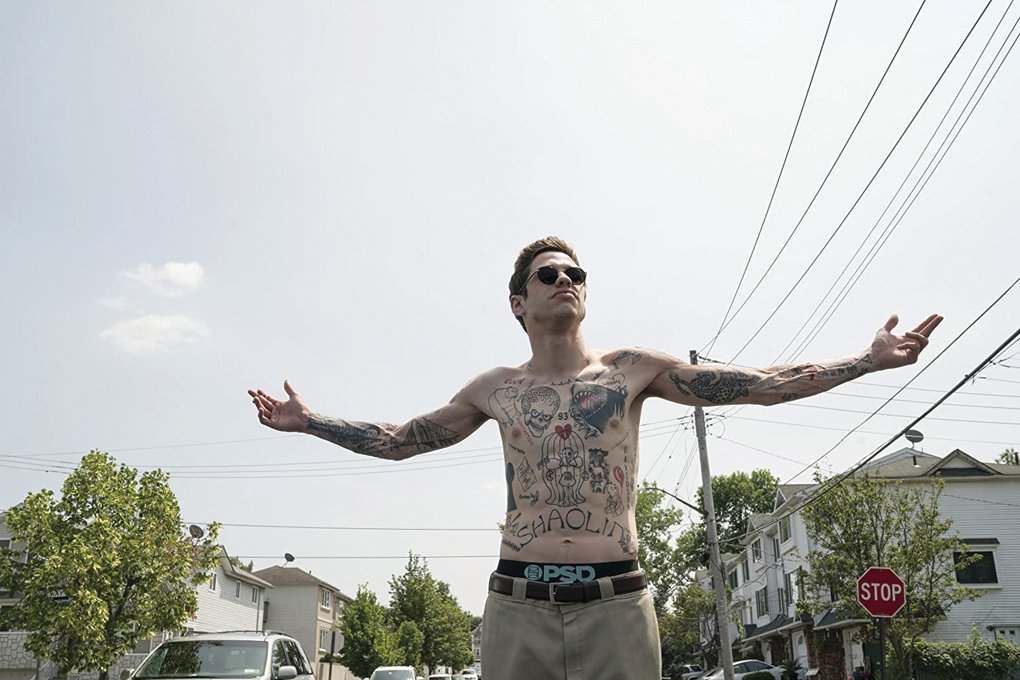
Part roman-à-clef and part cinematic couch session, “The King of Staten Island” makes no secret about its origins and purpose. Comedian Pete Davidson, best known for his ongoing roller coaster stint as a feature cast member on “Saturday Night Live,” stars as Scott, a name adopted from Davidson’s late father. Like Davidson, Scott’s dad was a firefighter who perished on the job when Scott was old enough to know him but young enough that he could not cope with the psychological scars.
Now aged 24, Scott still lives with his long-suffering mom, Margie (Marisa Tomei). He whiles away his days playing video games and smoking weed with his coterie of stoner friends (most played by Davidson’s real-life mates, including ex Carly Aquilino). Scott sabotages jobs and relationships, including a childhood pal-turned-friend with benefits, Kelsey (Bel Powley). Scott harbors cockeyed hopes of opening a part-restaurant, part-tattoo parlor, an aspiration that is really just an excuse for him to ignore other attainable vocations. Scott is a loser to the unaware, and he even wields the death of his dad — the lone justifiable excuse for malaise and bad behavior — as a weapon against anyone who dares to help or motivate him.
A semi-moderating force in Scott’s life is his younger sister, Claire (Maude Apatow). When she leaves for college, Scott and Margie are left with just their uneasy familial bond, which is the one constant element in their lives but also the one thing hindering each from finally overcoming their shared loss. They seemingly cannot live without each other, but they cannot move on with their lives together, either.
Enter Ray (Bill Burr), the dad of a 9-year-old Scott stupidly agrees to tattoo. Ray is a bit of a ne’er do well with his own personal foibles, but he is also a firefighter dedicated to his job and his station mates. Ray and Claire become smitten, and their burgeoning romance, along with Ray’s attempts at tough love, upset Scott’s arrested development. Scott starts to scheme ways to break them up, even as he develops an affinity for Ray’s kids.
Director Judd Apatow has build his career around portraying misfits struggling to cope with the societal norms and responsibilities: “Freaks and Geeks,” “The 40-Year-Old Virgin,” “Knocked Up,” “Trainwreck,” and even his 2018 documentary about the late Garry Shandling. In “The King of Staten Island,” Apatow offers Davidson a platform to exorcise demons and amplify his pain to friends, family, and the general public. Scott is not a particularly likable person — when Margie finally tells him to move out of her house, Scott’s petulance tempers any callousness of her demand. With nowhere to live, Scott ends up living at a firehouse with a fireman as a father figure, the last place he wanted to be but perhaps the one place he needed to end up.
Some supporting characters are not developed in a meaningful or consistent manner. We cheer Margie when she finally decides to stand up for herself, yet Apatow laces that with one particularly callous scene towards Scott followed by her lazy detente with Scott and Ray for the sake of a tidy ending. Both Kelsey and Claire feel like they have engaging individual stories that would have serviced the film better than just being Scott’s foils.
“The King of Staten Island” is charming and droll, an entirely satisfying slice of streaming entertainment to cut through the darkness of shuttered theaters (originally slated for a theatrical run, the film will open via video on demand on June 12). It ends up in the comfortable place of assuaging Davidson’s torment while venerating the bravery and bond of firefighters. But there is also a nagging feeling that the film placates more than it rehabilitates. At one point, Scott is the lookout for a foiled robbery carried out by his pals. They get arrested while Scott flees, never facing legal redress or any ire from his friends, who don’t rat him out or resent him. Scott is given a pass, free to mature on his own schedule. Davidson has undoubtedly suffered a high cost. Hopefully he and his friends and family are done paying the bill.